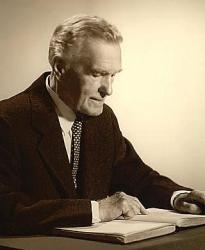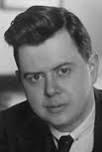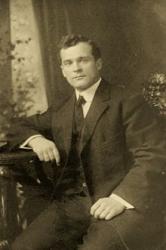Planning worship?
Check out our sister site, ZeteoSearch.org,
for 20+ additional resources related to your search.
- |
User Links
Person Results
‹ Return to hymnal



Export as CSV
John J. Moment

1875 - 1959 Person Name: John M. Moment Hymnal Number: 5 Author of "Holy, holy" in The Hymnal for Youth John James Moment, 1875-1959
Born: February 1, 1875, Orono, Ontario, Canada.
Died: May 11, 1959, Plainfield, New Jersey.
Son of a Methodist minister, Moment was educated at Princeton University (BA 1896) and Hartford Theological Seminary (BD 1906). He began his career teaching at the Lawrenceville school about five miles from Princeton (1898-1904). He held pastorates in East Orange, New Jersey (1904-08); Jersey City, New Jersey (1908-11); High St. Presbyterian Church, Newark, New Jersey (1911-18); and the Crescent Avenue Presbyterian Church, Plainfield, New Jersey (from 1919 until his retirement). From March to December 1918, Moment was the Religious Work Secretary for the Young Men’s Christian Association at Camp Upton, Yaphank, Long Island, New York. He lived in Plainfield, New Jersey, from at least 1920 until his death.
© The Cyber Hymnal (www.hymntime.com/tch)
John J. Moment
H. C. Macdougall
1858 - 1945 Hymnal Number: 298 Composer of "[Let the words of my mouth]" in The Hymnal for Youth
H. C. Macdougall
William B. Forbush
1868 - 1927 Person Name: William Byron Forbush Hymnal Number: 179 Author of "God of our youth, to whom we yield" in The Hymnal for Youth Born: February 20, 1868, Springfield, Vermont.
Died: October 23, 1927, Philadelphia, Pennsylvania.
Buried: Quaker Burial Grounds, Hartford Road, Baltimore, Maryland.
Forbush graduated from Dartmouth College (Phi Beta Kappa) in 1888, and became a principal in Amherst, New Hampshire, the next year. He served as pastor of the Riverside Congregational Church, Riverside, Rhode Island (1893-94), entered Union Theological Seminary, in 1889, graduating in 1892. He received an AM in 1890 and PhD in 1892 from the University of New York, and was acting pastor at the Rockaway Church in Brooklyn while enrolled in 1890. He served as pastor at Riverside Church in East Providence, Rhode Island (1892); Tabernacle Church, Yarmouth, Nova Scotia (1894-96); Warren, Massachusetts (1896-1908); Winthrop Church, Boston, Massachusetts (1905-06); and Woodward Avenue, Detroit, Michigan (to 1913). In 1913, he became President of the American Institute of Child Life in Philadelphia, resigning in 1914 to pursue writing. He established his home in Swarthmore, Pennsylvania, where he lived the rest of his life and for a time headed the Woolman House, a school of social and religious education under the Quaker management of Swarthmore. In 1895, he received an honorary Doctor of Laws degree from Hanover College, Indiana. He founded the Knights of King Arthur in 1893, which attracted thousands of young boys. In 1918, he became General Editor of the publications of the University Society of New York, serving until 1924, when he became consulting editor of the John C. Winston Publishing Company of Philadelphia, Pennsylvania. His works include:
The Queens of Avalon, 1911
The Coming Generation (New York & London: D. Appleton and Company, 1912)
Manual of Stories, 1915
The Wonder Book of Myths and Legends (The John C. Winston Company: 1928)
Myths and Legends of Greece and Rome
--www.hymntime.com/tch/
William B. Forbush
W. J. Dawson
1854 - 1928 Person Name: William J. Dawson Hymnal Number: 86 Author of "When the golden evening gathered" in The Hymnal for Youth Born: November 21, 1854, Towcester, Northampton, England.
Son of William James and Susan Waller Dawson, William was educated at Didsbury College, Manchester, and ordained a Wesleyan minister in 1875. He married Jane Powell of Lowestoft in 1879, and served in various locations until assuming the pastorate of Highbury Quadrant Congregational Church, London, in 1892. The previous year, he was one of the English delegates to the Methodist Ecumenical Council in Washington, DC. He liked America so much that he emigrated there in 1905, joining the Presbyterians and first serving at the First Church in Newark, New Jersey. His works include:
A Vision of Souls, 1884
Question and Vision, 1886
A Threshold of Manhood, 1889
Makers of English, 1889
Makers of English Prose, 1899
The Man Christ Jesus, 1901
The Reproach of Christ, 1903
The Quest of the Simple Life, 1903
Makers of English Fiction, 1905
The Empire of Love, 1907
America, and Other Poems, 1912
The American Hymnal, 1913
Robert Shenstone, a novel, 1917
The Father of a Soldier, 1917
The Autobiography of a Mind, 1925
--www.hymntime.com/tch/
W. J. Dawson
Sir Ernest MacMillan

1893 - 1973 Person Name: Ernest MacMillan Hymnal Number: 47 Arranger of "TEMPUS ADEST FLORIDUM" in The Hymnal for Youth Ernest MacMillan (Conductor)
Born: August 18, 1893 - Mimico, Canada
Died: May 6, 1973 - Toronto, Canada
The eminent Canadian conductor and composer, Sir Ernest (Alexander Campbell) MacMillan, began his organ studies with Arthur Blakeley in Toronto at age 8, making his public debut at 10. He continued his organ studies with A. Hollins in Edinburgh from 1905 to 1908, where he was also admitted to the classes of F. Niecks and W.B. Ross at the University.
Ernest MacMillan was made an associate (1907) and a fellow (1911) of London’s Royal College of Organists, and in 1911 received the extramural Bachelor of Music degree from the University of Oxford. He studied modern history at the University of Toronto from 1911 to 1914, before receiving piano instruction from Therese Chaigneau in Paris in 1914. In 1914 he attended the Bayreuth Festival, only to be interned as an enemy alien at the outbreak of World War I. While being held at the Ruhleben camp near Berlin, he gained experience as a conductor. He was awarded the B.A. degree in absentia by the University of Toronto in 1915. His ode, England, submitted through the Prisoners of War Education Committee to the University of Oxford, won him his Doctor of Music degree in 1918.
After his release, Ernest MacMillan returned to Toronto as organist and choirmaster of Timothy Eaton Memorial Church from 1919 to 1925. In 1920 he joined the staff of the Canadian Academy of Music, and remained with it when it became the Toronto Conservatory of Music, serving from 1926 to 1942 as its principal. He was also dean of music faculty at the University of Toronto from 1927 to 1952.
Ernest MacMillan was conductor of the Toronto Symphony Orchestra from 1931 to 1956, and of the Mendelssohn Choir there from 1942 to 1957. He also appeared as guest conductor in North and South America, Europe, and Australia. He served as president of the Canadian Music Council from 1947 to 1966, and of the Canadian Music Centre from 1959 to 1970. In 1935 he was the first Canadian musician to be knighted, an honour conferred upon him by King George V. He also received honorary doctorates from Canadian and USA institutions. He conducted many works new to his homeland, both traditional and contemporary.
--www.bach-cantatas.com/
Sir Ernest MacMillan
Sebastian Dabovitch
Hymnal Number: 304 Arranger of "[Lord, have mercy upon us]" in The Hymnal for Youth
Sebastian Dabovitch
Harry Webb Farrington

1880 - 1930 Hymnal Number: 213 Author of "I know not how that Bethlehem's Babe" in The Hymnal for Youth
Harry Webb Farrington
George Lomas
1834 - 1884 Person Name: George Lomas (1834-1884) Hymnal Number: 230 Composer of "SURSUM CORDA" in The Hymnal for Youth Born: 1834, Birch Hall, Bolton, Lancashire, England.
Died: 1884, Sheffield, South Yorkshire, England.
A student of William Sterndale Bennett and Charles Steggall, Lomas received his BMus degree from New College, Oxford. He played the organ at Didsbury Parish Church, and at Emmanuel Church, Barlow Moor, Manchester (1858-84).
Music: CHAMOUNI
ST. PAUL'S COLLEGE
SURSUM CORDA
http://www.hymntime.com/tch/bio/l/o/m/lomas_g.htm
=============
George Lomas was born in England and was a volunteer organist for twenty-five years before becoming a professional musician. He received his Bachelor of Arts degree in music at age forty-five, only five years before his death.
The Presbyterian Hymnal Companion, 1993
George Lomas
Roderic Dunkerley
1884 - 1966 Hymnal Number: 287 Author of "Dear Father, whom we cannot see" in The Hymnal for Youth Born: 1884, Ealing, West London, England.
Died: May 1966.
Roderick’s father was hymnist William Dunkerley. His works include:
The Great Awakening, 1915
The Arm of God,1916
Postman’s Knock, 1918
The Proclamation, 1920
The Unwritten Gospel, 1925
First Prayers, 1929
The Pageant of the King’s Children, with his father, 1930
Treasure Trove, 1948
The Secret Moment, 1949
The Hope of Jesus, 1953
At the House of the Interpreter, 1956
Beyond the Gospels, 1957
Prayer Time in the Junior School, with his son, Gregor Hamilton Dunkerley, 1958
--www.hymntime.com/tch/
Roderic Dunkerley


 My Starred Hymns
My Starred Hymns


